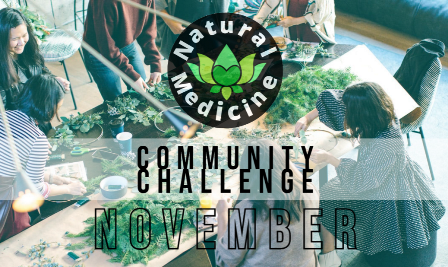## Reto NaturalMedicine Mes de Noviembre: Medicinas Herbales (Esp - Eng) ##### (English version below) Feliz y bendecido presente para todos, Desde que vi el reto del mes de noviembre de la Comunidad de Natural Medicine, quise probar con el tema de medicinas herbales para motivarme a leer sobre este tema que desde hace tiempo lo tengo pendiente, y debo decirles que fue muy interesante saber que podemos encontrar muchas plantas con efectos medicinales súper poderosos.

https://files.peakd.com/file/peakd-hive/miriannalis/Dxg3tGIP-aloevera-on-the-table.jpg Fuente: [Freepik](https://www.freepik.com/free-photo/aloevera-table_9011160.htm#page=1&query=aloe%20vera&position=4)
Dentro de las propiedades más resaltantes de la Aloe Vera se encuentran: Antiséptico, cicatrizante, calmante y digestivo. Recuerdo que cuando era niña mi hermana mayor tuvo una terrible quemadura de primer grado en las manos y mi mamá uso esta planta de sábila para ayudarla a cicatrizar, todos pensamos que le quedarían unas cicatrices en sus manos terribles y afortunadamente no le quedó rastro alguno de aquél incidente. Leyendo sobre esta planta, me di cuenta que una de sus propiedades más resaltantes es su capacidad para regenerar células de la piel y tejidos, por ello me parece importantísimo llevarla en el botiquín porque además de las quemaduras, también pudiera ser muy útil en el caso de una cortada, picaduras de insectos, psoriasis, ampollas, irritaciones, insolación o cualquier lesión en la piel. Incluso una cosa que me sorprendió mucho de sus propiedades, fue el uso para eliminar hongos y virus, y sirve como un exfoliante suave para eliminar las células muertas de la piel, manteniéndola saludable. Adicionalmente, tiene efecto analgésico y antiinflamatorio, protege el sistema inmunitario y tiene acción digestiva y depurativa. Por sus propiedades analgésicas y antiinflamatorias, podemos masajear el gel de sábila sobre luxaciones, esguinces, tendinitis, lumbago y golpes. En el caso del sistema digestivo, es recomendable para ayudar a la cicatrización interna de úlceras, también es un laxante suave y ayuda en casos de colon irritable, entre otros. Voy a indagar un poco más sobre esta planta, pero luego de leer esta información básica tengo ganas de incorporar su consumo a mi dieta para medir sus resultados a nivel digestivo. ### 2. JENGIBRE
https://files.peakd.com/file/peakd-hive/miriannalis/LqmQMeDO-ginger-1738098_1280.jpg Fuente: [Pixabay](https://pixabay.com/es/photos/jengibre-ingber-immerwurzel-la-ra%C3%ADz-1738098/)
El Jengibre es antibacteriano, mejora la circulación, es antiinflamatorio, y muy útil para mejorar problemas del sistema respiratorio y digestivo. En la investigación que hice del jengibre, vi algunas recomendaciones de hacer una cocción del jengibre con harina de linaza para usarlo como un cataplasma para dolores reumáticos y neurálgicos. En el caso de las enfermedades respiratorias (muy frecuentes en estos tiempos) se puede hervir el jengibre con canela y clavo de olor para potenciar sus efectos antibacterianos, e incluso agregar zumo de limón (aunque estos últimos serían ingredientes adicionales dentro del botíquin). Adicionalmente, se ha comprobado que el uso del jengibre ayuda a disminuir el exceso de acidez gástrica y también el nivel del colesterol, de aquí su relevancia en el tratamiento de afecciones digestivas. Otro tips para su uso, es que se puede masticar una rodaja pequeña y fina de jengibre para combatir el mal aliento y los dolores de muelas. Y aquí les comparto el último dato curioso que encontré del jengibre: > ###### Mejora la movilidad de los espermatozoides. ### 3. TORONJIL
https://files.peakd.com/file/peakd-hive/miriannalis/qU2rcVT0-melissa-5218673_1280.jpg Fuente: [Pixabay](https://pixabay.com/es/photos/toronjil-curaci%C3%B3n-hierba-m%C3%A9dico-5218673/)
Aunque es más comúnmente conocida por su efecto sedante y para ayudar a conciliar el sueño, es una planta muy versátil para ayudar en otras áreas, de hecho se caracteriza también por sus efectos: tónico, digestivo, antiespasmódico, antiséptico y carminativo. Les confieso que no estaba familiarizada con esta palabra “carminativo”, por ello busqué su significado en [Wikipedia](https://es.wikipedia.org/wiki/Carminativo) según la cual: Un carminativo es un “medicamento o sustancia que favorece la disminución de la generación de gases en el tubo digestivo y con ello disminuyen las flatulencias y cólicos. El efecto se refiere a un efecto antiespasmódico en los músculos estomacales lisos y a un efecto de disminución de la fermentación en la flora intestinal”. Es también cicatrizante, muy útil en el caso de picaduras de insectos. Ahondando en sus beneficios, estuve leyendo que ayuda a aliviar dolores reumáticos, calambres o espasmos en el estómago, taquicardia, mareos, diarreas, ansiedad e insomnio. También ayuda a calmar el asma y jaquecas de origen nervioso. Gracias por visitar mi Blog, espero te haya resultado interesante mi investigación. Si deseas saber más sobre los retos de NaturalMedicine para el mes de noviembre, consulta este [enlace]( https://peakd.com/hive-120078/@naturalmedicine/something-a-little-different-choose-your-own-posting-adventure-win-hive-and-lotus-tokens)

https://files.peakd.com/file/peakd-hive/miriannalis/Yqy2fTza-aloe-4529704_1280.jpg Fuente: [Pixabay](https://pixabay.com/es/photos/aloe-alo-hoja-%C3%A1loe-vera-4529704/)
Among the most outstanding properties of Aloe Vera are Antiseptic, healing, soothing and digestive. I remember that when I was a child my older sister had a terrible first degree burn on her hands and my mother used this aloe vera plant to help her heal. We all thought that she would have some terrible scars on her hands and fortunately she had no trace of that incident. Reading about this plant, I realized that one of its most remarkable properties is its ability to regenerate skin cells and tissues, so I think it's very important to carry it in the first aid kit because in addition to burns, it could also be very useful in the case of a cut, insect bites, psoriasis, blisters, irritations, sunstroke or any injury to the skin. Even one thing that surprised me a lot about its properties, was the use to eliminate fungi and viruses, and serves as a gentle exfoliant to remove dead skin cells, keeping it healthy. Additionally, it has an analgesic and anti-inflammatory effect, protects the immune system and has a digestive and purifying action. Due to its analgesic and anti-inflammatory properties, we can massage the aloe vera gel on dislocations, sprains, tendinitis, lumbago and bruises. In the case of the digestive system, it's recommended to help internal healing of ulcers, it's also a mild laxative and helps in cases of irritable colon, among others. I´m going to investigate a little more about this plant, but after reading this basic information I feel like incorporating its consumption into my diet to measure its results at the digestive level. ### 2. GINGER
https://files.peakd.com/file/peakd-hive/miriannalis/dUgljCWf-ginger-1714196_1280.jpg Fuente: [Pixabay](https://pixabay.com/es/photos/jengibre-remedios-naturales-1714196/)
Ginger is antibacterial, improves circulation, is anti-inflammatory, and very useful for improving problems of the respiratory and digestive system. In the research I did on ginger, I saw some recommendations to make a cooking of ginger with flaxseed flour to use it as a poultice for rheumatic and neuralgic pains. In the case of respiratory diseases (very frequent in these times) you can boil ginger with cinnamon and cloves to enhance its antibacterial effects, and even add lemon juice (although the latter would be additional ingredients within the first aid bottling). Additionally, it has been proven that the use of ginger helps to reduce excess gastric acidity and also the level of cholesterol, hence its relevance in the treatment of digestive disorders. Another tip for its use, is that you can chew a small, thin slice of ginger to fight bad breath and toothaches. And here I share with you the last curious fact I found about ginger: > ###### It improves the mobility of the spermatozoa. ### 3. TORONJIL
https://files.peakd.com/file/peakd-hive/miriannalis/mvtfFGzU-melissa-5218495_1280.jpg Fuente: [Pixabay](https://pixabay.com/es/photos/toronjil-t%C3%A9-discreta-hierba-verde-5218495/)
Although it's more commonly known for its sedative effect and to help sleep, it's a very versatile plant to help in other areas, in fact it's also characterized by its effects: tonic, digestive, antispasmodic, antiseptic and carminative. I confess that I was not familiar with this word "carminative", so I looked up its meaning in [Wikipedia](https://es.wikipedia.org/wiki/Carminativo) according to which: A carminative is a "medicine or substance that promotes the reduction of gas generation in the digestive tract and thus reduces flatulence and colic. The effect refers to an antispasmodic effect on the smooth stomach muscles and a decrease in fermentation in the intestinal flora". It's also healing, very useful in the case of insect bites. Delving into its benefits, I was reading that it helps to relieve rheumatic pain, cramps or spasms in the stomach, tachycardia, dizziness, diarrhea, anxiety and insomnia. It also helps to calm asthma and headaches of nervous origin. Thanks for visiting my blog, I hope you found my research interesting. If you want to know more about the challenges of NaturalMedicine for the month of November, check this [link](https://peakd.com/hive-120078/@naturalmedicine/something-a-little-different-choose-your-own-posting-adventure-win-hive-and-lotus-tokens) Translated with www.DeepL.com/Translator (free version)



Originally posted here: https://hive.blog/hive-120078/@miriannalis/reto-naturalmedicine-mes-de-noviembre-medicinas-herbales-esp-eng
No comments:
Post a Comment